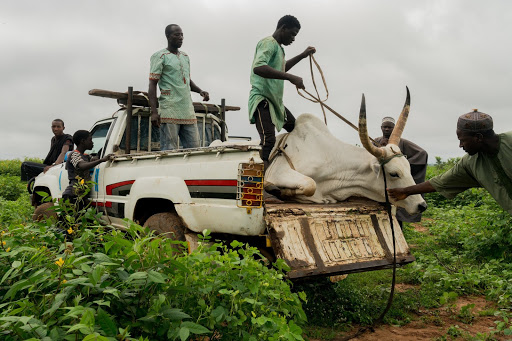‘Quit Notice’: 4,000 Herders Arrive Kaduna Community From Southern Nigeria
Over 4000 cattle herders have arrived at a Kaduna community in Northwest Nigeria after receiving quit notice from Sunday Igboho, a private citizen.

No fewer than 4,000 of the Fulani herdsmen who fled from the southern Nigerian states following the reported quit notice served them have so far seeped into Labduga, a community in Kachia Local Government Area of Kaduna State, northwest Nigeria.
A Kaduna State Emergency Management Agency (SEMA) official, Hussaini Abdullahi, disclosed this to HumAngle on Feb. 9, adding that as of Tuesday morning, “more were still trickling in”.
He stressed: “We have so far verified about 4,000, but more were still coming in as at this morning.”
Abdullahi said Kaduna SEMA and a non-governmental organisation, Early Recovery Initiative (formally North-East Regional Initiative – NERI), took up the task of profiling the migrants for possible assistance and reintegration.
“Because we do not operate a conventional camp for them, they have been melting into the host community, sourcing immediate assistance from relatives and good Samaritans,” he said.
“Having lost their means of livelihood, they told us they needed food and non-food items urgently. But we have also observed that they are suffering psychosocial trauma and they, therefore, need psychosocial counselling,” he added.
He would not disclose when such assistance would be given to the displaced herdsmen by the government or partner-non-profit organisations.
“We will soon visit them and conduct a needs assessment of their situation to see where we can possibly assist,” Ibrahim Bayero, the Director of Publicity, Kaduna State branch of Miyetti Allah Cattle Breeders Association of Nigeria (MACBAN), told HumAngle on phone.
Herding communities that settled in parts of southern Nigeria have been forced to leave following unrest and attacks by locals, who have blamed members of the former for increased criminal activities.
Governor of Ondo State, Rotimi Akeredolu, had issued a seven-day ultimatum for herders to leave the state’s forest reserves. He said on Jan. 18 that cases of kidnapping and other crimes were traceable to the activities of “some bad elements masquerading as herdsmen”.
“These felons have turned our forest reserves into hideouts for keeping victims of kidnapping, negotiating for ransom and carrying out other criminal activities.”
Two days earlier, political thug and businessman Sunday ‘Igboho’ Adeyemo had stormed the residence of the Seriki Fulani in Oyo State, Saliu Abdulkadir, to issue a similar seven-day ultimatum, citing rising insecurity in the region.
Videos have surfaced showing similar evictions of Fulani settlements in southeast Nigeria.
Meanwhile, Senior Advocate of Nigeria Femi Falana cautioned that Igboho lacked the authority to issue such notices.
“Anybody who is affected by such illegal quit notices would have to go to court to stop whoever is issuing the notices. That is the law but don’t let us resort to violence; it is unnecessary. With profound respect under our laws, even a squatter cannot be ejected and that is why on a daily basis, tenants are given quit notices by landlords or owners of properties,” he told BBC.
“So, a private citizen cannot wake up and say anybody should leave the community. You must embrace the rule of law. Nobody can do that, not even the government because section 43 of the constitution says every citizen shall have the right to own and acquire properties in any parts of the country.”
The human rights lawyer further advised against the criminal profiling of ethnic groups.
“If anybody has committed an offence or a group of people has committed an offence, we must fish them out and have them tried under the law but you can’t wake up and say all Yoruba people, all Hausa people are criminals, all Igbo people are criminals. No, it is a fallacy of generalisation,” he submitted.
Support Our Journalism
There are millions of ordinary people affected by conflict in Africa whose stories are missing in the mainstream media. HumAngle is determined to tell those challenging and under-reported stories, hoping that the people impacted by these conflicts will find the safety and security they deserve.
To ensure that we continue to provide public service coverage, we have a small favour to ask you. We want you to be part of our journalistic endeavour by contributing a token to us.
Your donation will further promote a robust, free, and independent media.
Donate HereStay Closer To The Stories That Matter




